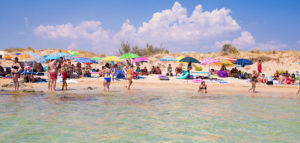It happened in Teignmouth. Drizzly Devon on a summer’s day in the early Seventies. We’d come back to the coach park early, Mum and me, having explored the town. In a shack at the gate was a man selling Mars Bars. “Let’s have one,” I implored.
And then something I had been saving up to say: “Let’s break the silly rules!”
The rules, until that day, had been strict. All manner of behaviour, from the growing of Begonias in front gardens to the stressing of the second syllable in the word controversy, were unacceptable in our little, class-obsessed lives. But very close to the top of the list — second only perhaps to the use of the word toilet — was eating in public. On building sites, one could make an exception, or in the trenches in wars — but not in normal life, not even on holiday.
But Mum was on a journey of her own. A child to look after, a new world of social disruption to cope with, a husband who had gone mad. And in Teignmouth that afternoon she cracked, and the happiest day of my young life was complete. We bought the Mars Bar and divided it and ate it — not entirely in the open air (we used a bus shelter to protect our dignity) — but defying the Gods who policed the division between upper- and lower-middle class, we scoffed the lot.
It was only a day trip. But it was the greatest holiday of my life. It was a harbinger of happier times ahead, of freedom from self-imposed distress. We could look across the flat grey sea and imagine blue skies, sunny days, the sound of laughter. We were laughing ourselves as we got back on the coach.
A few years ago, while driving one of my daughters home from school, I was making what I thought were some trenchant observations about the joys of their modern childhoods and the depredations of my youth.
“When daddy was young,” I said as we wove our way through traffic, “we didn’t even have a car!”
“Oh, when were they invented?”
The Seventies is ancient history. Black-and-white times, as my kids still call it. Phones with dials in draughty halls. Coal smoke, cigarette smoke, everyone coughing, expiring. Heart attacks taking men who unwisely ran for a bus. Whispers about “the big C”. IRA bombs. Our little house: my step-father suicidal, Mum taking tablets called Quiet Life. But the quiet, when it came, not making anything better.
One thing, though, made everything better. I was in love with coaches. The company was called Roman City and the day their summer brochure was published we would queue outside the shop and ask solemnly for two, please: they were free and Mum and I enjoyed the reckless abandon of possessing our own separate copies.
There was not much else of the devil-may-care or even the vaguely hedonistic in our small world. But on four or five summer Saturdays, courtesy of Roman City coaches, we would escape it — Mum and me — and head for Plymouth via Dartmoor, or Brighton and Hove, or Swansea and the Mumbles, or London for the Ideal Home Exhibition. A drive from our little box in an unfashionable outer suburb of Bath to a better world. In which I would feast not on the destination but on the journey. My memories are not of buckets and spades or the smell of the sea or the sound of the gulls. They are of the open road, where the diesel could spew into fields as we dipped down into villages or pulled into pub carparks.
Coach trips in the Seventies were exercises in grounding. Connection to the person you were with, devoid of any distractions. Too noisy to read and too uncomfortable to snooze. No phones, of course. Connection as well to the land, to place and to places. The vehicles themselves were heaving wrecks, stifling in summer heat. They often broke down but never in the modern way, with software issues that can only be solved in a lab. It was all hardware: a spanner could resolve matters. The drivers sometimes returned to base with smears of grease on their faces.
And when the beasts were coaxed up some country lane in Devon or Somerset or Warwickshire or Wye Valley, you were close to the hedges. You moved slowly and noisily and stared out — and people in these places stared back. I can still picture the aftermath of an accident somewhere near Ilminster in deepest Somerset: squeezing our vehicle past a small group of people in tears, luggage strewn by the side of a road. Grittier than any train view. Uncomfortably close to the action.
For those of us in the downwardly mobile, upper-middle class, the coach trip also provided a community mixing that modern travel, modern holidays, would never match. I am not pretending this was necessarily to my mother’s liking. If you abhor those you regard as lower-middle class, a day trip to Minehead is an unwise holiday choice. But she did it for me and the result was a bonding between us that grew ever stronger as we giggled and raised our eyes at our fellow passengers in their crimplene suits, with their concern about “toilet breaks” and willingness to eat sandwiches in full view of each other as if they were farm animals or scaffolders.
Nobody on the coach — least of all the two of us, social snobs but educational illiterates — would have been familiar with arguments about rationalism and its sometimes baleful discontent-inducing influence on human existence. But years later, at the LSE, I would spend many hours in the company of disciples of the recently retired philosopher Michael Oakeshott, and I remember thinking then how my life, and the lives of many others in the Seventies, matched his intellectual preference — conservative with a small c — for what works over what might be.
True: nothing much did work back then. But the absence of grand intellectual plans in the pre-Thatcher age gave our lives a kind of messy satisfaction we miss today — and opportunities, in the grimmest of seaside towns, for small moments of real joy. As Oakeshott put it, we preferred “present laughter to Utopian bliss”. Never mind dreams of frolicking in the sun if you can have a Mars Bar in Teignmouth and enjoy it.
Don’t overthink life: that for me was the lesson of those holiday trips. You can dream of course of better times, sunnier holidays, changes in circumstance. But live in the moment, savour the fumes, the small intense pleasures that can make life meaningful.
My kids have swanky holidays. We go abroad. They know (too much) about room service. During one American trip, I asked one of them what she wanted to be when she grew up; she thought for a few moments before answering, “a guest!” They take photos of sunsets, of meals, of themselves.
And, frankly, I am glad. I would not visit my early life on anyone, and certainly not my own children. But still, they miss out — we all miss out in the modern holiday world — on the small pleasures we enjoyed in the days before Instagram, before colour, before choice. If you have been on a British Seventies coach holiday, you have learned how to cope, how to make do, how to stay cheerful. You have no need of the sun. You carry it in you.
Disclaimer
Some of the posts we share are controversial and we do not necessarily agree with them in the whole extend. Sometimes we agree with the content or part of it but we do not agree with the narration or language. Nevertheless we find them somehow interesting, valuable and/or informative or we share them, because we strongly believe in freedom of speech, free press and journalism. We strongly encourage you to have a critical approach to all the content, do your own research and analysis to build your own opinion.
We would be glad to have your feedback.
Source: UnHerd Read the original article here: https://unherd.com/




